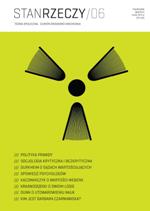(Ukryte) zaangażowanie i (pozorna) neutralność: Strukturalne ograniczenia rozwoju socjologii krytycznej w warunkach półperyferyjnych
(A Hidden) Involvement and (an Apparent) Neutrality. Structural Restrictions of Development of Critical Sociology in Semi-Peripheral Conditions
Author(s): Tomasz Zarycki, Tomasz WarczokSubject(s): Social Sciences
Published by: Wydawnictwa Uniwersytetu Warszawskiego
Keywords: socjologia polska; socjologia krytyczna; socjologia publiczna; Bourdieu; kapitał kulturowy; sociology in Poland; critical sociology; public sociology; Bourdieu; cultural capital
Summary/Abstract: The paper draws a picture of a wider social context of functioning of sociology in Poland. Authors rely primarily on the methodology of Pierre Bourdieu to achieve this aim. In particular they reconstruct the general position of the sociological field in relation to the wider field of power and the specific characteristic of the later. They include, as the authors see them, domination of the cultural capital over the economic capital and the resulting hegemony of the intelligentsia in the field of power. Another important characteristic of the Polish field of power, which seems typical for most peripheral societies, is its division on to one part orientated towards the integration with the global core and its other part challenging the global domination, though, mostly in the cultural sphere. This division is also clearly transmitted into the structure of the sociological field, given its relatively restricted autonomy and results in a strong superiority of public sociology over the weakly developed critical sociology. Abstrakt Artykuł rysuje szerszy kontekst społeczny funkcjonowania socjologii w Polsce. Autorzy odwołują się w tym celu w pierwszej kolejności do metodologii Pierre’a Bourdieu, rekonstruując w ogólnych zarysach pozycję pola socjologicznego w szerszym polu władzy, a także specyficzne cechy tego ostatniego. Należy do nich w ich przekonaniu dominacja kapitału kulturowego nad ekonomicznym i związana z tym hegemonia szeroko rozumianej inteligencji. Ważną cechą polskiego pola władzy jest też jego charakterystyczny dla krajów peryferyjnych podział na część zorientowaną na integrację z globalnym centrum i część stawiającą mu względny, głównie kulturowy, opór. Podział ten przenosi się również wyraźnie na pole socjologiczne, co jest związane z ograniczoną autonomią tego ostatniego i owocuje między innymi znaczącą w Polsce przewagą nurtu socjologii publicznej nad nurtem socjologii krytycznej.
Journal: Stan Rzeczy
- Issue Year: 2014
- Issue No: 6
- Page Range: 129-158
- Page Count: 22
- Language: Polish

